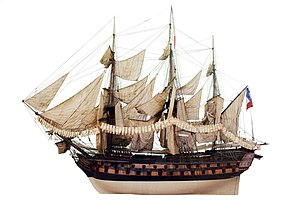Diomède was a Téméraire-class 74-gun ship of the line of the French Navy built at Lorient and launched in 1799 as Union . She was renamed Diomède in 1803.
 Scale model of Achille, sister ship of French ship Diomède (1803), on display at the Musée national de la Marine in Paris.
| |
| History | |
|---|---|
| Name | Diomède |
| Launched | 1 August 1799 as Union |
| Renamed | Diomède 1803 |
| Fate |
|
| General characteristics | |
| Class and type | Téméraire-class ship of the line |
| Displacement |
|
| Length | 55.87 metres (183.3 ft) (172 pied) |
| Beam | 14.90 metres (48 ft 11 in) |
| Draught | 7.26 metres (23.8 ft) (22 pied) |
| Propulsion | Up to 2,485 m2 (26,750 sq ft) of sails |
| Armament |
|
During the War of the Third Coalition, Diomède was part of a French force that sailed from Brest, France, on 13 December 1805 for what was planned as a 14-month cruise to attack British merchant shipping while avoiding combat with major Royal Navy forces.[1][2] On 15 December 1805, the French force split into two squadrons which proceeded independently from one another.[1] Diomède was part of the squadron under the overall command of Vice-Admiral Corentin-Urbain Leissègues, which headed across the Atlantic Ocean bound for the Caribbean.[1] During the voyage, Diomède suffered serious damage in a storm off the Azores in late December 1805.[3][4] She arrived with most of the squadron at French-held Santo Domingo on Hispaniola on 20 January 1806, where Leissègues ordered the ships to be recaulked after their long and difficult transatlantic voyage.[4][5]
On the morning of 6 February 1806, a Royal Navy squadron under the command of Vice-Admiral Sir John Thomas Duckworth arrived off Santo Domingo to attack Leissègues's force.[3] Although several of Leissègues's ships were not yet ready for sea,[6] Leissègues ordered them to get underway and sail westward along the coast of Hispaniola toward Nizao.[7] In the resulting Battle of San Domingo, the French squadron maintained close formation, and the five French ships of the line formed a line of battle with Diomède third in line behind Alexandre and Impérial and ahead of Jupiter and Brave.[3] Duckworth ordered his squadron to concentrate fire on the three leading French ships of the line,[3] and accordingly the British 74-gun third-rate ship of the line HMS Spencer opened fire on Impérial and Diomède simultaneously.[8] As the engagement at the head of the French line became confused, with ships of the two sides intermingled and smoke restricting visibility, Diomède came across the 98-gun second-rate ship of the line HMS Atlas and fired a heavy broadside into her, after which Atlas engaged her at close range.[9][10] Spencer also resumed firing at Diomède.[9] Impérial turned toward shore and Diomède followed her, and late in the morning both ships ran aground parallel to the beach on a reef 1 nautical mile (1.9 km; 1.2 mi) off the coast of Hispaniola between Nizao and Point Catalan, suffering severe hull damage and losing all of their masts.[11][12] As the British ships moved out of gunnery range, the crews of Diomède and Impérial assembled on deck to abandon ship.[12] Diomède had suffered about 250 casualties.[13][14]
Leissègues ordered Diomède and Impérial burned as soon as their crews had completed their abandonment of the ships,[4] but before that order could be carried out, boat crews from the fifth-rate frigates HMS Acasta and HMS Magicienne boarded them on 8 February 1806 and captured them without meeting any resistance.[15] The British boarding party took 150 prisoners aboard Diomède including her commanding officer, Captain Jean-Baptiste Henry, and then burned her wreck.[13][14]
References
edit- ^ a b c Clowes, p. 184.
- ^ Gardner, p. 20.
- ^ a b c d Clowes, p. 189.
- ^ a b c James, Vol. IV, p. 198.
- ^ Longman, Rees, Orme, Brown, Green and Longman (1837). The Annual Biography and Obituary 1835, Volume 29. Fisher, Son and Jackson. p. 47.
{{cite book}}: CS1 maint: multiple names: authors list (link) - ^ James, Vol. IV, p. 190.
- ^ "No. 15902". The London Gazette. 24 March 1806. p. 371.
- ^ James, Vol. IV, p. 191.
- ^ a b Clowes, p. 191.
- ^ Gardner, p. 24.
- ^ Clowes, p. 192.
- ^ a b James, Vol. IV, p. 193.
- ^ a b James, Vol. IV, pp. 196–197.
- ^ a b "No. 15902". The London Gazette. 24 March 1806. pp. 371–374.
- ^ James, Vol. IV, p. 197.
Bibliography
edit- Clowes, William Laird (1997) [1900]. The Royal Navy, A History from the Earliest Times to 1900, Volume V. Chatham Publishing. ISBN 1-86176-014-0.
- Gardiner, Robert, ed. (2001) [1998]. The Victory of Seapower. Caxton Editions. ISBN 1-84067-359-1.
- James, William (2002) [1827]. The Naval History of Great Britain, Volume 4, 1805–1807. Conway Maritime Press. ISBN 0-85177-908-5.